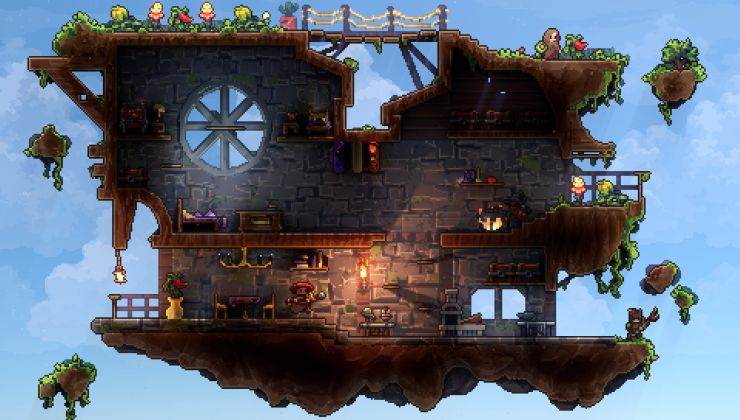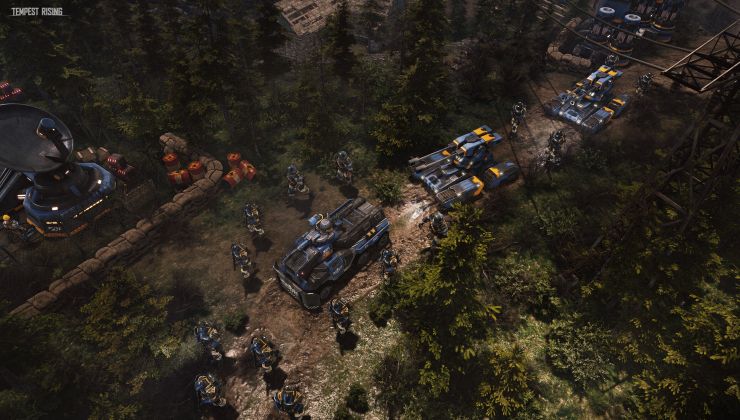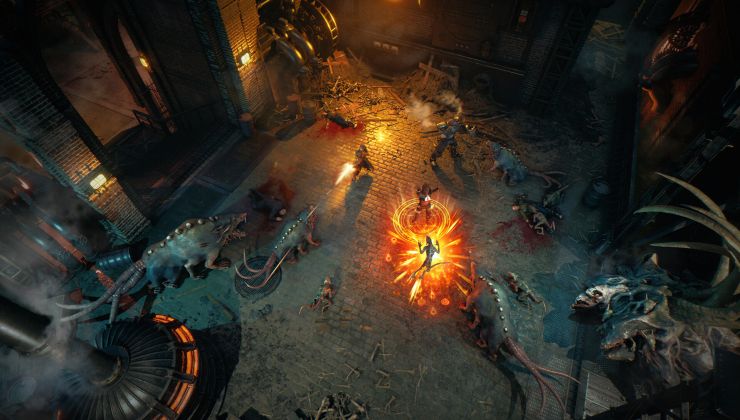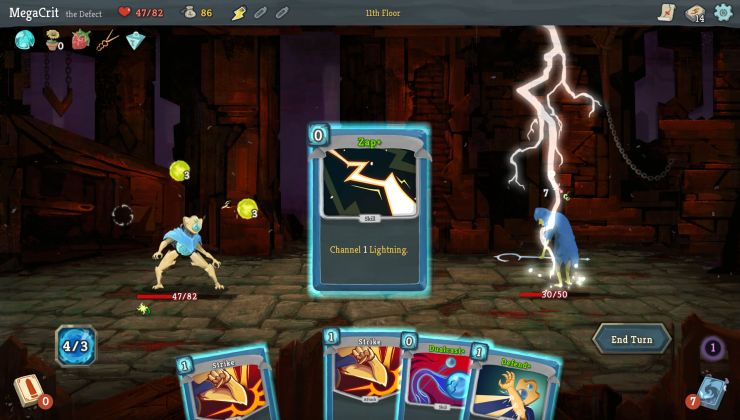Remember Playtron and PlaytronOS? They made an attempt at a big splash recently with plans to create a Linux-powered system to rival SteamOS (Steam Deck) and Windows across various devices and multiple stores. The first device has been announced and it's some weird web3 thing.
I should note, Playtron's CEO offered some details before the announcement, but didn't actually follow-up on providing me with anything. So I'm simply going by what has been announced and the seemingly official page for it is mostly blank, with just a newsletter sign up box.
It was announced at Sui Basecamp (Sui being a Web3 blockchain company) with the reveal from Mysten Labs. According to Sui it's called the SuiPlay0x1 and it will be released in 2025. As noted on X (formerly Twitter): "SuiPlay0X1 runs Playtron's device-agnostic gaming operating system, enabling gamers to play both Web3 and Web2 games across PC and mobile."
And uh, it looks apparently like this:
 Picture credit: Sui/Mysten Labs/Playtron
Picture credit: Sui/Mysten Labs/Playtron
Those sticks and d-pad look rather terrible don't think? Why is it so flat? That does not look comfortable to game with. GamesBeat have some more details, noting it will have "native Sui blockchain integration via zkLogin and Sui Kiosk SDKs, enabling asset ownership directly connected to a device’s account system for the first time in the gaming industry" and it might cost somewhere around $500 and while it seems to have deep integration with Sui blockchain stuff, it will support other stores too. Doesn't seem like any technical specifications have been given out yet.
So if blockchain web3 stuff is your jam, then you might be interested in this I guess? Not one for me honestly.
Until Playtron actually get some agreements to be on more…normal devices, I don't really see it going anywhere. At least once they eventually release the first public builds of the Linux-based PlaytronOS we might see what they're really up to.
What are your thoughts? Let me know in the comments.
Jesus. That's an eye opener.His channel in general is, as well as being quite entertaining - I highly recommend digging into it.
But OK, maybe instead of items in games we could buy and sell games themselves. It certainly sounds like an appealing idea. But how would it actually work? As a permissionless database, everything in it is public, and anything traded on it can be seen by anyone. You could trade some sort of "token" that you now "own" a particular game, but…what does that mean? You still need to download it from somewhere server somewhere in such a way that everyone else on the blockchain can't just download it as well (so you can't have the token include any sort of "key"), which means we're back to some sort of centralized database monitoring who "owns" each game to be able to dole them out (and of course, the games would require some sort of DRM to make sure you couldn't just keep playing them after you've sold them!). And if you have such a centralized database already, you don't need to add a blockchain onto it, you could just have that database (or multiple centralized databases with a hand-off mechanism).
I agree that Valve would like you to stay in their ecosystem for economic reasons, but if Valve and Epic Games suddenly both decided one day that they'd like people to be able to sell games between their platforms they could do it without any blockchain technology.
Ooh I know the answer.
You can just include a piece of data you also include in the drm of the game in the nft and sell it from a developer approved wallet/signing key(means the same in this case).
This way the blockchain itself is the proof as long the first wallet it came from(which by design is tracable in most blockchains) is the approved wallet, the data is the same as the hardcoded value and the current owner has the key of the last wallet we know it's legit. We still have to check if multiple players have the key of the currently holding wallet, but that can simply be achieved that the wallet contains sum too attractive to steal or by embedding some kind of hardware id hash in the transaction.
The blockchain is that monitoring database you talk about. It's inneficient, because for it to be trustworthy thousands of copies of it have to exist. It's big, because it tracks much more than only your ownership. Making changes is intentionally expensive, because otherwise everybody would be doing it, but it's possible.
This is the one thing blockchain can actually do. Assign ownership to a single instance of arbitrary data it can still be copied, but the copy can be recognized as such.
The reason why this will never work. Is, because it requires active work from the people who benefit from a lack of a second hand market and because nobody trusts anything blockchain related for good reason.
Last edited by LoudTechie on 13 Apr 2024 at 11:46 am UTC
Timely video about NFT/crypto/Web 3.0-gaming from the excellent Jauwn, who covers these things from the perspective of an actual gamer.One thing I find interesting about them is that not only are the games he tries bad, and in at least one case represent massive copyright violation, none of them actually seem to be using any of the buzzwordy stuff. The most any of them seem to do is sell a few "NFTs" that are just . . . pictures, that aren't even in-game items, and probably aren't even NFTs in any real sense because it seems like they're selling the same picture to everyone. Probably AI-generated pictures too.
So they're scammy, but not because they're actually even using the scammy technologies to scam anyone--rather, they're just using the buzzwords to try to persuade gullible cryptobros to buy nearly nonexistent games.
I suppose this doesn't really prove that those technologies couldn't be used in games; rather, it suggests that actually taking the trouble to write a game is not nearly a quick enough way to get rich for the tastes of the kind of get-rich-quick scammers who are involved with NFTs etc.
Ooh I know the answer.Interesting, thank you! This hypothetical DRM would have to be Internet-connected so it could check the state of the blockchain every time you try to play the game, right? So you can't copy it to an air-gapped machine while you own it, then keep playing after you've sold it?
You can just include a piece of data you also include in the drm of the game in the nft and sell it from a developer approved wallet/signing key(means the same in this case).
This way the blockchain itself is the proof as long the first wallet it came from(which by design is tracable in most blockchains) is the approved wallet, the data is the same as the hardcoded value and the current owner has the key of the last wallet we know it's legit. We still have to check if multiple players have the key of the currently holding wallet, but that can simply be achieved that the wallet contains sum too attractive to steal or by embedding some kind of hardware id hash in the transaction.
The blockchain is that monitoring database you talk about. It's inneficient, because for it to be trustworthy thousands of copies of it have to exist. It's big, because it tracks much more than only your ownership. Making changes is intentionally expensive, because otherwise everybody would be doing it, but it's possible.
This is the one thing blockchain can actually do. Assign ownership to a single instance of arbitrary data it can still be copied, but the copy can be recognized as such.
Timely video about NFT/crypto/Web 3.0-gaming from the excellent Jauwn, who covers these things from the perspective of an actual gamer.OK, that part about the game that tried to steal and repackage a free open-source game but did it so incompetently that the original game creators were able to push an update that made the rip-off unplayable was hilarious.
Ooh I know the answer.Interesting, thank you! This hypothetical DRM would have to be Internet-connected so it could check the state of the blockchain every time you try to play the game, right? So you can't copy it to an air-gapped machine while you own it, then keep playing after you've sold it?
You can just include a piece of data you also include in the drm of the game in the nft and sell it from a developer approved wallet/signing key(means the same in this case).
This way the blockchain itself is the proof as long the first wallet it came from(which by design is tracable in most blockchains) is the approved wallet, the data is the same as the hardcoded value and the current owner has the key of the last wallet we know it's legit. We still have to check if multiple players have the key of the currently holding wallet, but that can simply be achieved that the wallet contains sum too attractive to steal or by embedding some kind of hardware id hash in the transaction.
The blockchain is that monitoring database you talk about. It's inneficient, because for it to be trustworthy thousands of copies of it have to exist. It's big, because it tracks much more than only your ownership. Making changes is intentionally expensive, because otherwise everybody would be doing it, but it's possible.
This is the one thing blockchain can actually do. Assign ownership to a single instance of arbitrary data it can still be copied, but the copy can be recognized as such.
Oh, totally and to avoid tampering root permissions still have relevance.
Another win for this hypothetical blockchain based drm is that it diminishes one of the many many problems with drm a little though. It could allow for a game that is playable not so long as it parent company supports it, but so long as it parent company supports it + the blockchain exists.
Also you better hope partial downloading is actually supported for your blockchain otherwise you will be paying those chain checks in golden internet premiums.
Last edited by LoudTechie on 14 Apr 2024 at 11:29 am UTC
One thing I find interesting about them is that not only are the games he tries bad, and in at least one case represent massive copyright violation, none of them actually seem to be using any of the buzzwordy stuff. The most any of them seem to do is sell a few "NFTs" that are just . . . pictures, that aren't even in-game items, and probably aren't even NFTs in any real sense because it seems like they're selling the same picture to everyone. Probably AI-generated pictures too.Yep! And just think, those are what this hypothetical machine is being pitched for the playing of.
So they're scammy, but not because they're actually even using the scammy technologies to scam anyone--rather, they're just using the buzzwords to try to persuade gullible cryptobros to buy nearly nonexistent games.
I suppose this doesn't really prove that those technologies couldn't be used in games; rather, it suggests that actually taking the trouble to write a game is not nearly a quick enough way to get rich for the tastes of the kind of get-rich-quick scammers who are involved with NFTs etc.
I ask you, PLG, would you buy a machine dedicated to barely-games like those?
OK, that part about the game that tried to steal and repackage a free open-source game but did it so incompetently that the original game creators were able to push an update that made the rip-off unplayable was hilarious.It cracked me up, I must admit. Props to the real dev - it was a genius move!
Last edited by Pengling on 14 Apr 2024 at 12:03 pm UTC
It sounds to me to be about as good of an idea as the Barcode Battler.You keep dunking on it, but I swear it took at least a couple of days before we got bored with my classmate's Barcode Battler. I mean, it was a new gadget and we were nerdy kids in our pre-teens.
You keep dunking on it, but I swear it took at least a couple of days before we got bored with my classmate's Barcode Battler. I mean, it was a new gadget and we were nerdy kids in our pre-teens.Hehe, I should be clearer, I guess (I may have mentioned this in another thread, but I can't remember for sure off of the top of my head, so pardon me if I'm repeating myself!). I've got no issue with the device itself (it's just not my thing), and the way I refer to it is jokingly.
What I took issue with as a youngster, and the reason I occasionally still mention it today, was how the British press were so disingenuous in claiming that the Barcode Battler was a true competitor to systems like the Game Boy, Game Gear, and Atari Lynx, and did so whilst banking on ignorant (and sometimes scared) parents guided by even-more-ignorant (and considerably more insidious and controlling) busybodies in their local communities.
Anyhow, a couple of days is probably a record with the device, to be fair. At any rate, it's still more usable than the SuiPlay0x1 render looks!
Last edited by Pengling on 14 Apr 2024 at 4:56 pm UTC
Many won't understand NFTs until Steam removes trading cards (their ToS allows them to do it).
Ok, let's play through this: Steam removes trading cards. You've got a signature somewhere in a blockchain that one of many million of those cards is yours. What now? I sure won't buy it from you, because... what would it do for me? I can't show it in my profile, I can't make a set, I cannot do anything with it! Neither can you. So... what?
You might not be able to show it on your Steam profile, but any website could read the data from blockchain and display them. That's even if Steam removed it from their API.
You might not be able to show it on your Steam profile, but any website could read the data from blockchain and display them. That's even if Steam removed it from their API.There's a website that already archives all that stuff, though, and they don't need the blockchain to do it. Not that the blockchain actually stores image-data in the first place.
NFTs enable securely buy/sell your items on secondary markets without an intermediate, the blockchain is just a permissionless distributed database. Steam is against this because they don't want the items traded on secondary markets, they want you be vendor-locked to their platform.This is where I tend to get lost when I try to connect theory to practice. In theory, it sounds great. In practice…what secondary markets exist between games? If I buy some ultra-deluxe Pokéball in Pokémon: Crypto & Currency edition, I can't exactly use it in Call of Duty, nor can I take a sniper rifle into Stardew Valley. I can certainly imagine horrible cash-grab cross-overs where you buy like a skin in one game and another game allows you to use it there, but that's quite superficial, and merely requires coordination and cooperation between the games involved, not a blockchain per se.
Secondary market doesn't mean "same item implemented in multiple games. Secondary market means the same item sold it multiple markets.
Traditionally, in order to sell your CS skins, you would need to sell it on primary market or send them to escrow account who handles the sale. Worst case, you would beed to sell your whole account to sell one item.
With distributed ledger and smart-contracts, you can have the item in your wallet and have a sale listing on multiple secondary markets without the need of escrow.
Many won't understand NFTs until Steam removes trading cards (their ToS allows them to do it).
Ok, let's play through this: Steam removes trading cards. You've got a signature somewhere in a blockchain that one of many million of those cards is yours. What now? I sure won't buy it from you, because... what would it do for me? I can't show it in my profile, I can't make a set, I cannot do anything with it! Neither can you. So... what?
You might not be able to show it on your Steam profile, but any website could read the data from blockchain and display them. That's even if Steam removed it from their API.
Yeah, but... why? I can display anything in my browser at any time. Without a block chain. And without any website either.
And I'm not buying trading cards to admire their looks to begin with.
Last edited by Eike on 16 Apr 2024 at 12:42 pm UTC
Many won't understand NFTs until Steam removes trading cards (their ToS allows them to do it). People need to lose something before they start looking for alternative solutions. I am sometimes surprised how slow this process is, even when free-to-play online servers get closed left and right and people losing everything they spent on micro-transactions.
Fun fact, Valve's flop Artifact still has trading cards, but none of them load because the images are only on Steam servers. Images of properly done NFTs are stored on IPFS (torrent like filesystem accessible via web gateways).
Just like the countless NFTs that had their image links have long expired... Lmfao.
Literally all NFTs are doing is to store a link to an image on somewhere... that may not keep working forever.
https://www.theverge.com/2021/3/25/22349242/nft-metadata-explained-art-crypto-urls-links-ipfs
http://web.archive.org/web/20230620174607/https://twitter.com/0xkofi/status/1664556455515635713
I love it when cryptobros shill their so called "improvement" when it actually doesn't solve anything *at best*.
Would you be surprised to know that Verge doesn't know what they are writing about? IPFS works like a torrent, so anyone who downloads the assets could also seed them if needed because the URL is unique to content hash. If a traditional URL goes down, there is nothing you can do other than hope the domain becomes available so, you could fix the broken links.
Since IPFS not mandatory for NFTs, there will be many NFTs that still use traditional URLs that can broke.
Many won't understand NFTs until Steam removes trading cards (their ToS allows them to do it). People need to lose something before they start looking for alternative solutions. I am sometimes surprised how slow this process is, even when free-to-play online servers get closed left and right and people losing everything they spent on micro-transactions.
Fun fact, Valve's flop Artifact still has trading cards, but none of them load because the images are only on Steam servers. Images of properly done NFTs are stored on IPFS (torrent like filesystem accessible via web gateways).
Just like the countless NFTs that had their image links have long expired... Lmfao.
Literally all NFTs are doing is to store a link to an image on somewhere... that may not keep working forever.
https://www.theverge.com/2021/3/25/22349242/nft-metadata-explained-art-crypto-urls-links-ipfs
http://web.archive.org/web/20230620174607/https://twitter.com/0xkofi/status/1664556455515635713
I love it when cryptobros shill their so called "improvement" when it actually doesn't solve anything *at best*.
Would you be surprised to know that Verge doesn't know what they are writing about? IPFS works like a torrent, so anyone who downloads the assets could also seed them if needed because the URL is unique to content hash. If a traditional URL goes down, there is nothing you can do other than hope the domain becomes available so, you could fix the broken links.
Since IPFS not mandatory for NFTs, there will be many NFTs that still use traditional URLs that can broke.
Sooooo... that's a roundabout way of saying NFTs don't solve the problem you're claiming them to solve. Got it.
The scenario you described assumes that people will keep "seeding" it forever, and lemme tell you, torrents don't keep up forever either. Once you're down to 0 seeders, you're screwed. A cryptobro "reinvented" version of it will behave exactly the same here, only with more wasting of electricity. :V
Edit: Took a bit of a time to research what IPFS is all about and I'd like to take my last word back. It doesn't seem to have any relations to any crypto "invention".
Still, the point stands. You can still lose the file, just like in torrents. And you still buy *a link to somewhere* with an NFT.
Also just noticed that you mentioned "so anyone who downloads the assets" as if one thing the NFTs got meme'd on wasn't the "right click and save" thing lmao. Here they can do it without right clicking at all, that's even more convenient!
Last edited by LupertEverett on 18 Apr 2024 at 7:19 pm UTC
I see! Thanks for the clarification.NFTs enable securely buy/sell your items on secondary markets without an intermediate, the blockchain is just a permissionless distributed database. Steam is against this because they don't want the items traded on secondary markets, they want you be vendor-locked to their platform.This is where I tend to get lost when I try to connect theory to practice. In theory, it sounds great. In practice…what secondary markets exist between games? If I buy some ultra-deluxe Pokéball in Pokémon: Crypto & Currency edition, I can't exactly use it in Call of Duty, nor can I take a sniper rifle into Stardew Valley. I can certainly imagine horrible cash-grab cross-overs where you buy like a skin in one game and another game allows you to use it there, but that's quite superficial, and merely requires coordination and cooperation between the games involved, not a blockchain per se.
Secondary market doesn't mean "same item implemented in multiple games. Secondary market means the same item sold it multiple markets.
The point of NFT is that you can sell it to someone else, when you do not want to play anymore, or when you gain a better one.
Which can be completly implemented without NFTs if the game publisher wants, and can be completly blocked by the publisher if he wants even when using NFTs.
So where is the necessity for NFTs again?
Sure, but that's limited to one store/platform. You can't leave the store with that item and you can only find a buyer in that same store. If you put that in real world context, you wouldn't consider that owning something. Buying non-NFT digital items is illusion of owning these items.
NFTs enable securely buy/sell your items on secondary markets without an intermediate, the blockchain is just a permissionless distributed database. Steam is against this because they don't want the items traded on secondary markets, they want you be vendor-locked to their platform.
A nft of a in game item can still be accpunt bpund or be banned if the publisher of the game decides so. on the other hand he can allow for it to be transfered between accpints without charges when he decides so. where is the neccesity for nfts in this case?







See more from me